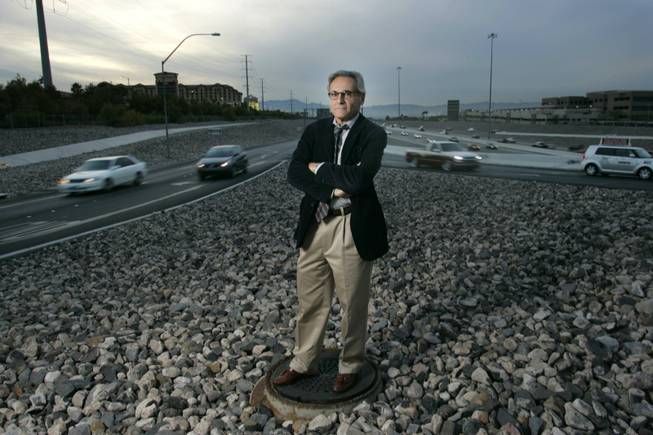
Brookings Institution senior fellow Pietro S. Nivola stands on a roadside Wednesday in Henderson. Nivola says the surest path to energy conservation and lower emissions in the United States is not via government-imposed fuel efficiency standards, but through a higher tax on gasoline.
Thursday, Nov. 12, 2009 | 2 a.m.
If You Go
- When: 5:30 to 6:30 p.m. today
- Where: UNLV’s Science and Engineering Building auditorium
- Cost: Free
Sun Archives
- Brookings economist: Industries need to bolster their images (10-10-2009)
- More Nevadans will need help as economic storm worsens (9-27-2009)
- Six questions for Robert Lang (9-10-2009)
- The potential for prosperity in Las Vegas (9-9-2009)
- Experts: Despite downturn, Las Vegas has hope (9-8-2009)
- Washington think tank with ideas for the West starts UNLV partnership (9-8-2009)
- UNLV forms partnership with Brookings Institution (9-2-2009)
Beyond the Sun
To conserve energy, we need a higher gas tax. But wait, before you get angry: We’ll offset it with a cut in your income or payroll taxes.
That’s the prescription of Pietro S. Nivola, Brookings Institution senior fellow, who will talk about America’s largely unsuccessful energy conservation efforts this evening at UNLV.
Conserving energy has all kinds of benefits, of course. We get to spend our money on other things. We’re less dependent on oil from hostile countries. We lower carbon emissions, which cause global warming.
Nivola, whose lecture is one in a series as part of a new partnership between Brookings and UNLV, said our efforts to conserve petrol have been flawed from the start, mostly through accidents of history and the idiosyncrasies of American politics.
To conserve gas, we rely on the Corporate Average Fuel Economy, or CAFE standards, which Congress mandated in 1975, after the first Middle Eastern oil embargo, to reduce energy consumption by increasing the fuel economy of cars and light trucks.
Unfortunately, the CAFE scheme turned out to be largely ineffective, at least compared with the rest of the developed world.
Congress wanted to double the 1974 passenger car fuel economy average, to 27.5 miles per gallon, by 1985. Since then, the target hasn’t moved, although a deadline to increase CAFE to 35.5 mpg by 2020 was moved up to 2016 by President Barack Obama.
There’s a giant loophole, however, Nivola pointed out. Sport-utility vehicles are considered “light trucks,” which had a much lower standard of 22.2 mpg as of 2007.
When the law was passed, Nivola noted, SUVs and pickups made up a tiny fraction of the vehicle fleet. Now, they’re about half. And the biggest flaw — vehicles that weigh more than 8,500 pounds, including some of the behemoth trucks and SUVs on the road, are not subject to CAFE standards at all.
As a result, our cars and trucks are wildly inefficient compared with Europe’s; that fleet will average a whopping 50 miles per gallon by 2012.
How have Europeans done it?
Not by government fiat through CAFE standards, but by higher gas taxes.
Nivola says gas taxes with some real bite give drivers pause when they’re at the pump. Consequently, higher taxes lead to less driving. Consumers also then demand more fuel efficient cars from automakers, so you wind up with the equivalent of CAFE standards anyway.
The prospect of $5-per-gallon gas may be outrageous, but what if it were offset with a cut in income or payroll taxes, as Nivola advocates?
This way, you could choose to drive less and come out ahead.
We don’t have higher gas taxes because back in the early days of the auto, the states began levying gas taxes first and then raised a ruckus when the federal government tried to poach.
The federal gas tax was a penny until World War II, when it went up slightly. By the 1950s, when America moved to the suburbs and needed cars for everything, the gas tax became politically toxic, and it has stayed that way.
Republicans hate all taxes, and Democrats don’t like consumption taxes such as the gas tax because they’re regressive — they hit the poor and middle class more than the rich.
Europeans, on both the left and right, are more open to consumption taxes, Nivola says.
As it happens, Nivola notes, economists of all stripes think the U.S. should move toward taxing consumption with a commensurate cut in taxes on work, saving and investing.
It’s not clear members of Congress are familiar with this idea. If they are, apparently they have other priorities.

Join the Discussion:
Check this out for a full explanation of our conversion to the LiveFyre commenting system and instructions on how to sign up for an account.
Full comments policy